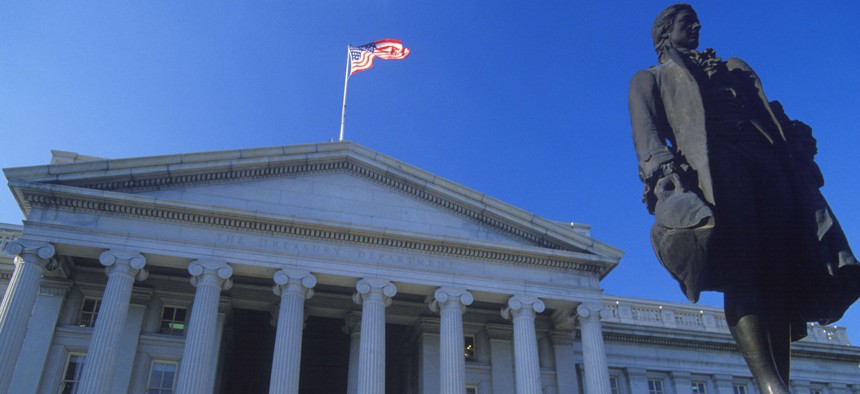Mayors Press for 'Opportunity Zones' Regulations in Treasury Meeting

The Treasury Department building in Washington, D.C. shutterstock

Connecting state and local government leaders
U.S. Conference of Mayors leaders say they're eager for capital to start flowing under the new economic development program.
WASHINGTON — A group of mayors let Treasury Secretary Steven Mnuchin know during a meeting here on Thursday that they're itching to see forthcoming guidance for the Opportunity Zones program and offered suggestions about what they'd like it to include.
One point the mayors emphasized is that they would like to see the guidelines allow other federal and state tax incentive and economic development programs to be used in conjunction with the Opportunity Zones initiative, which offers tax breaks meant to attract private investment to low-income communities.
"We're eager to see the regulations come out and to start seeing some of this capital flow into our communities," Mayor Steve Benjamin, of Columbia, South Carolina, told Route Fifty on Thursday.
"We wanted to bring a sense of urgency," he added.
Benjamin, who is the current president of the U.S. Conference of Mayors, also noted that there is strong bipartisan support among mayors for the program and said that the group who met with Mnuchin was pleased with the secretary's interest level in the initiative and his specific knowledge about it.
The Columbia mayor didn't offer specifics beyond saying "I wouldn't be surprised if we saw something meaningful this fall" when asked if the secretary gave any indication about when the guidelines might be issued. In July, a top White House economic adviser suggested the guidance would be out by the end of summer.
In response to an email asking if the department had any comment on Thursday's meeting, or could offer details on when the guidance might be issued, a Treasury spokesperson referred to a tweet from Mnuchin's Twitter account that said it was "Great to discuss opportunity zones with some dedicated members of the US Conference of Mayors," but offered no other information.
Investors and state and local policy makers see the guidance as a key step toward getting the Opportunity Zones program into full swing. But even without it some organizations, such as banks and "impact investors," are moving ahead to establish "Opportunity Funds," which will be able to make investments in areas eligible for the program.
"Nobody's waiting," said Mayor John Giles of Mesa, Arizona, who also attended the meeting. "I think the regs will come at about the right time for people to say 'I'm going to write a check now.'"
Mayor Greg Fischer of Louisville, Kentucky described two tracks he believes investments will follow under the program.
One is more of a "free market" scenario in which investors have their own ideas about where to put money. The other is a "prospectus approach" his city is embracing that involves the city government highlighting potential "catalytic projects" for investors.
Fischer noted a medical district and an area around a new soccer stadium that is now under construction as two examples of areas that could be ripe for investment in his city. "I think for a lot of the mayors it's like we've got particular projects in mind but we just don't have enough juice to get them done right now," he said.
Tax increment financing, infrastructure investment and workforce training can help bolster such projects, Fischer explained. "But they still need a couple extra points to make it happen," he added. "That's where these Opportunity Funds can be used."
The Louisville mayor stressed that he's less interested in investors coming to town seeking "maximum capital return" under the program and "exiting the city without leaving any income or wealth behind."
Detroit Mayor Mike Duggan and Rochester Hills, Michigan Mayor Bryan Barnett were among the other mayors who attended the meeting with Mnuchin. The mayors also met with U.S. Sen. Tim Scott, a South Carolina Republican who championed the Opportunity Zones program in Congress.
Created under last year's tax overhaul, the Opportunity Zones program provides tax breaks for individuals and companies that invest their capital gains into Opportunity Funds. The funds are supposed to make investments in economically distressed census tracts that governors in all 50 states have selected as zones.
"It's a very big deal. And if we have the ability to complement all the other good programs that are out there," Benjamin said, "it could be a game changer in a number of our cities."
Bill Lucia is a Senior Reporter for Government Executive's Route Fifty and is based in Washington, D.C.

NEXT STORY: Counting Kicks to Prevent Stillbirths





